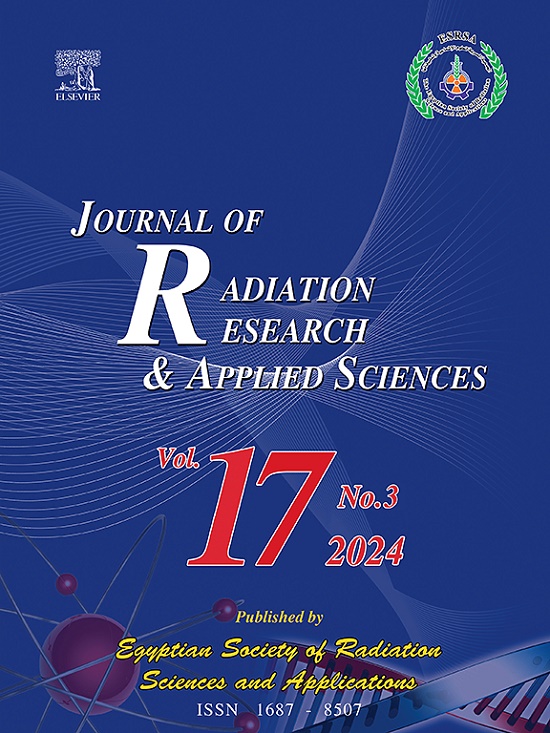WuMei-pill alleviates Parkinson's disease induced by dopamine neuron damage in mice by regulating the gut-brain-microbiome axis
IF 1.7
4区 综合性期刊
Q2 MULTIDISCIPLINARY SCIENCES
Journal of Radiation Research and Applied Sciences
Pub Date : 2025-05-27
DOI:10.1016/j.jrras.2025.101632
引用次数: 0
Abstract
Objective
To investigate the protective effects and the ways WuMei-Pill (WMP) work on Parkinson's disease (PD), focusing on its ability to restore the PD-induced gut microbiota imbalance and elucidate the underlying mechanisms.
Methods
This study employed LPS-induced inflammation BV2 cells and a PD mouse model induced by 6-OHDA to explore the treatment of WMP. A series of assessments were performed, encompassing behavioral evaluations, immunohistochemistry, Western blot, and ELISA, to evaluate the neuroprotective effect of WMP on PD. Fecal and brain samples were collected for microbiome and transcriptome analysis.
Results
WMP effectively reverses LPS-induced inflammation in BV2 cells. Based on PD mouse model, WMP treatment elevated neurological motor function (evidenced by reduced pole descent time and increased rotarod performance), increased the number of TH + cells, and brain dopamine levels. Microbiome dysbiosis correlates with exacerbated PD symptoms in the 6-OHDA model. 6-OHDA-induced dopaminergic neuronal damage was connected to an increase in pro-inflammatory bacteria (Bacteroides), bacteria involved in tryptophan metabolism (Azospirillum_sp.47_25 and unclassified Bacteroidia) and cholesterol metabolism, while the number of anti-inflammatory bacteria (Roseburia) was reduced. We also found changes in key brain metabolites, including L-tryptophan and Bambuterol. WMP normalized L-tryptophan levels, a precursor of neurotoxic kynurenine metabolites implicated in PD progression.
Conclusion
Dopaminergic neuron damage-induced microbiome dysbiosis worsen Parkinson's disease symptoms. WMP restores gut microbiota composition by reducing pro-inflammatory Bacteroides and upregulating anti-inflammatory Roseburia, while modulating L-tryptophan metabolism, thereby mitigating dopaminergic neuron loss.
乌梅丸通过调节肠-脑-微生物轴减轻小鼠多巴胺神经元损伤所致帕金森病
目的探讨乌梅丸(WMP)对帕金森病(PD)的保护作用及其机制,重点探讨其恢复PD诱导的肠道菌群失衡的能力,并阐明其机制。方法采用脂多糖诱导的炎症BV2细胞和6-OHDA诱导的PD小鼠模型,探讨WMP的治疗方法。通过行为评估、免疫组织化学、免疫印迹和ELISA等一系列评估来评估WMP对PD的神经保护作用。收集粪便和大脑样本进行微生物组和转录组分析。结果swmp能有效逆转脂多糖诱导的BV2细胞炎症。基于PD小鼠模型,WMP治疗提高了神经运动功能(通过减少极点下降时间和增加旋转杆性能证明),增加了TH +细胞数量和脑多巴胺水平。在6-OHDA模型中,微生物群失调与PD症状加重相关。6-羟多巴胺诱导的多巴胺能神经元损伤与促炎细菌(拟杆菌)的增加有关,细菌参与色氨酸代谢(Azospirillum_sp)。47_25和未分类的拟杆菌)和胆固醇代谢,而抗炎细菌(Roseburia)的数量减少。我们还发现了关键脑代谢物的变化,包括l -色氨酸和班布特罗。WMP使左旋色氨酸水平正常化,左旋色氨酸是神经毒性犬尿氨酸代谢产物的前体,与帕金森病的进展有关。结论多巴胺能神经元损伤引起的微生物群失调加重了帕金森病的症状。WMP通过减少促炎拟杆菌和上调抗炎玫瑰菌来恢复肠道微生物群组成,同时调节l -色氨酸代谢,从而减轻多巴胺能神经元的损失。
本文章由计算机程序翻译,如有差异,请以英文原文为准。
求助全文
约1分钟内获得全文
求助全文
来源期刊

Journal of Radiation Research and Applied Sciences
MULTIDISCIPLINARY SCIENCES-
自引率
5.90%
发文量
130
审稿时长
16 weeks
期刊介绍:
Journal of Radiation Research and Applied Sciences provides a high quality medium for the publication of substantial, original and scientific and technological papers on the development and applications of nuclear, radiation and isotopes in biology, medicine, drugs, biochemistry, microbiology, agriculture, entomology, food technology, chemistry, physics, solid states, engineering, environmental and applied sciences.
 求助内容:
求助内容: 应助结果提醒方式:
应助结果提醒方式:


